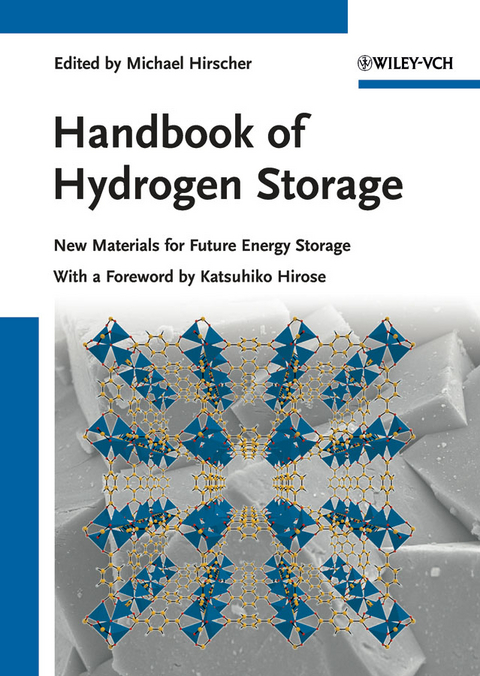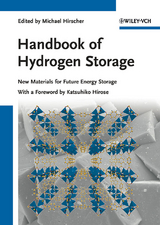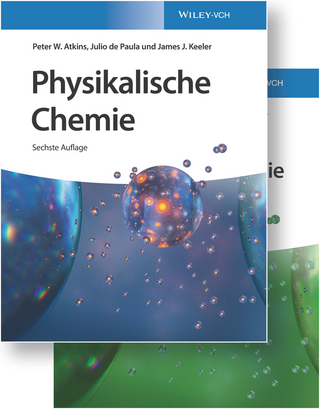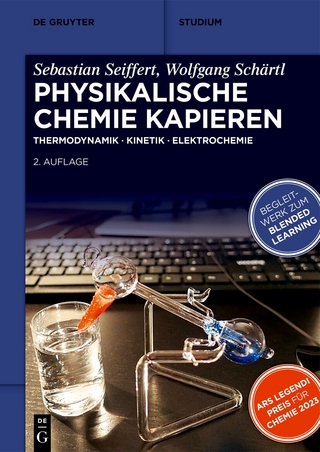Handbook of Hydrogen Storage
Wiley-VCH (Verlag)
978-3-527-32273-2 (ISBN)
Owing to the limited resources of fossil fuels, hydrogen is proposed as an alternative and environment-friendly energy carrier. However, its potential is limited by storage problems, especially for mobile applications. Current technologies, as compressed gas or liquefied hydrogen, comprise severe disadvantages and the storage of hydrogen in lightweight solids could be the solution to this problem.Since the optimal storage mechanism and optimal material have yet to be identified, this first handbook on the topic provides an excellent overview of the most probable candidates, highlighting both their advantages as well as drawbacks.From the contents:¿ Physisorption¿ Clathrates¿ Metal hydrides¿ Complex hydrides¿ Amides, imides, and mixtures¿ Tailoring Reaction Enthalpies¿ Borazan¿ Aluminum hydride¿ NanoparticlesA one-stop reference on all questions concerning hydrogen storage for physical and solid state chemists, materials scientists, chemical engineers, and physicists.
Michael Hirscher is group leader at the Max Planck Institute for Metals Research, Stuttgart, Germany. He studied physics at the University of Stuttgart, Germany and at the Oregon State University, Corvallis, USA, receiving a Master?s degree, a Diploma, and Ph.D. degree in 1982, 1984, and 1987, respectively. For his achievements he was awarded the Otto Hahn Medal of the Max Planck Society in 1988. Prior to taking his position in Stuttgart, he spent a post-doctoral fellowship at the University of Pennsylvania, Philadelphia, USA. He is a pioneer in the area of physisorption of hydrogen, studying the most advanced materials and revealing the limitations of carbon nanotubes. His current research interests focus on nanoporous and nanoscale materials for hydrogen storage.
Preface
STORAGE OF HYDROGEN IN THE PURE FORM
Introduction
Thermodynamic State and Properties
Gaseous Storage
Liquid Storage
Hybrid Storage
Comparison of Energy Densities
Conclusion
PHYSISORPTION IN POROUS MATERIALS
Introduction
Carbon Materials
Organic Polymers
Zeolites
Coordination Polymers
Conclusions
CLATHRATE HYDRATES
Introduction
Clathrate Hydrate Structures
Hydrogen Clathrate Hydrate
Kinetic Aspects of Hydrogen Clathrate Hydrate
Modeling of Hydrogen Clathrate Hydrates
Future of Hydrogen Storage
METAL HYDRIDES
Introduction
Elemental Hydrides
Thermodynamics of Metal Hydrides
Intermetallic Compounds
Practical Considerations
Metal Hydrides Systems
Nanocrystalline Mg and Mg-Based Alloys
Conclusion
COMPLEX HYDRIDES
Introduction
Complex Borohydrides
Complex Aluminum Hydrides
Complex Transition Metal Hydrides
Summary
AMIDES, IMIDES AND MIXTURES
Introduction
Hydrogen Storage Properties of Amide and Imide Systems
Structural Properties of Amide and Imide
Prospects of Amide and Imide Systems
Proposed Mechanism of the Hydrogen Storage Reaction in the Metal?N?H Systems
Summary
TAILORING REACTION ENTHALPIES OF HYDRIDES
Introduction
Thermodynamic Limitations of Lightweight Hydrides
Strategies to Alter the Reaction Enthalpies of Hydrides
Summary and Conclusion
AMMONIA BORANE AND RELATED COMPOUNDS AS HYDROGEN
SOURCE MATERIALS
Introduction
Materials Description and Characterization
Production
Thermally Induced Decomposition of Pure Ammonia Borane
ALUMINUM HYDRIDE (ALANE)
Introduction
Hydrogen Solubility and Diffusivity in Aluminum
Formation and Thermodynamics of Different Phases of Alane
Stability and Formation of Adduct Organo-Aluminum Hydride Compounds
Phases and Structures of Aluminum Hydride
Novel Attempts and Methods for Forming Alane Reversibly
Conclusion
NANOPARTICLES AND 3D SUPPORTED NANOMATERIALS
Introduction
Particle Size Effects
Non-Supported Clusters, Particles and Nanostructures
Support Effects
Preparation of Three-Dimensional Supported Nanomaterials
Experimental Results on 3D-Supported Nanomaterials
Conclusions and Outlook
| Erscheint lt. Verlag | 24.3.2010 |
|---|---|
| Vorwort | Katsuhiko Hirose |
| Sprache | englisch |
| Maße | 170 x 240 mm |
| Gewicht | 830 g |
| Themenwelt | Naturwissenschaften ► Chemie ► Physikalische Chemie |
| Schlagworte | Chemie • Chemistry • Coordination Chemistry • Festkörperchemie • Industrial Chemistry • Koordinationschemie • Materials Science • Materialwissenschaften • Metalle u. Legierungen • Metals & Alloys • Metals & Alloys • Nachhaltige u. Grüne Chemie • Physical Chemistry • Physikalische Chemie • solid state chemistry • Sustainable Chemistry & Green Chemistry • Sustainable Chemistry & Green Chemistry • Technische u. Industrielle Chemie • Wasserstoff • Wasserstoffspeicher • Werkstoff |
| ISBN-10 | 3-527-32273-6 / 3527322736 |
| ISBN-13 | 978-3-527-32273-2 / 9783527322732 |
| Zustand | Neuware |
| Haben Sie eine Frage zum Produkt? |
aus dem Bereich




